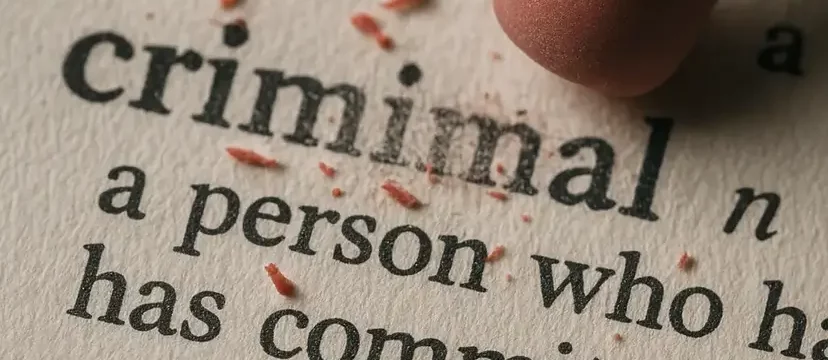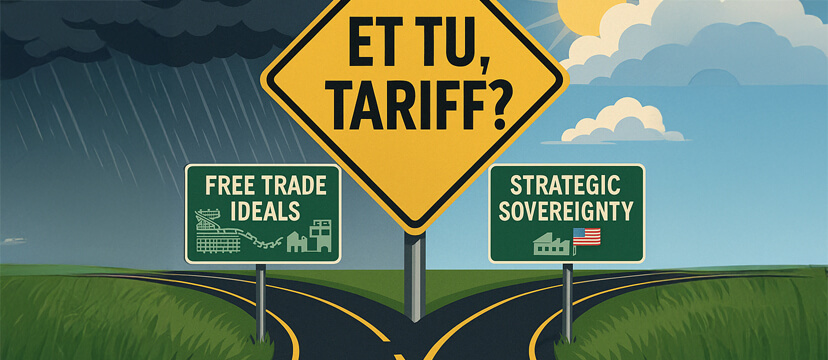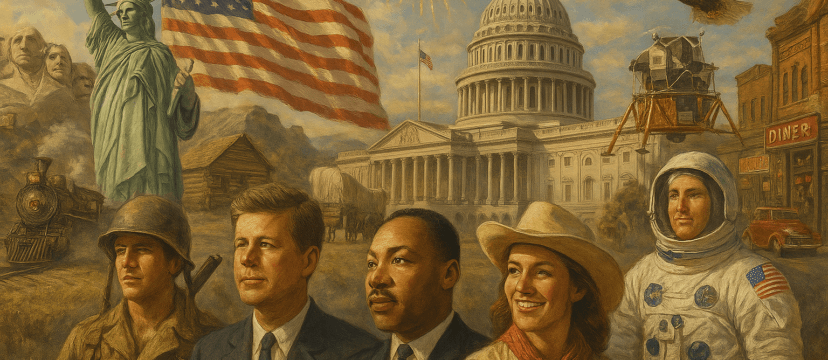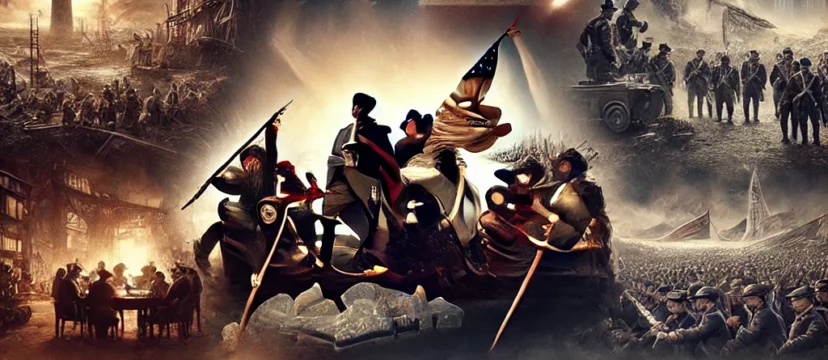In the movie Platoon, Tom Berenger plays a ruthless and cynical Sergeant while Willem Dafoe plays a more compassionate and principled one. Berenger—now drunk, a bottle of booze in hand—descends into a shelter where his men have been smoking pot and having a real good time, music and all. He takes a drink as they stop their festivities, trying to look “serious” when they see him. Slurring his words, he asks:
“Why do you smoke that shit?”
He pauses, looks around, and takes another drink.
“To escape reality?”
Then he pauses again, suddenly sober, and says bluntly:
“I’m reality.”
It’s a powerful, unsettling moment—because as their Sergeant, he holds their lives in his hands. Whether they like it or not, they must do what he orders them to do. Reality, in this sense, is not a matter of opinion. It is authority with consequences.
In Larry Arnn’s remarkable article in Imprimis (November 2025, Vol. 54, Issue 11), he advances a similarly stark thesis: America’s crisis is not political but metaphysical, and it cannot be solved by power, only by recovering the truth about what is real.
That claim frames everything that follows. Arnn describes our moment as a firestorm—not a single flame, but a collision of opposing forces that feed the same blaze. One wind is Trump and aggressive executive action. The other is the “Resistance” and cultural radicalism. They appear opposed. But they intensify the same instability. The firestorm is not “Trump versus the Left.” The firestorm is what happens when power meets power without a shared moral baseline.
Arnn is not offering a political solution. He is diagnosing a civilizational condition.
Fire
Arthur Brown’s campy 1960s song Fire opens with the line:
“I am the God of Hellfire and I bring you fire,
I’ll take you to burn.”
It’s worth listening to, because it captures something essential about Arnn’s metaphor — a fire does several kinds of destruction at once.
A firestorm is not chaotic by accident. It is mechanically precise: hot air rushing upward, cold air rushing inward, generating a self-sustaining system that consumes everything in its path. Conflict itself becomes the sustaining fuel.
Fire is energy—but energy does not clarify. It simply is. Years ago, I asked an electrical engineer what electricity is. He answered honestly: “We don’t know. We only know we can produce it and control it—most of the time.”
Fire is like that. Dangerous, yet comforting. Without fire, humanity would not have survived the elements. But uncontrolled, it destroys indiscriminately.
Arnn is arguing that we are living in a time of maximum intensity (fires breaking out everywhere) and minimal illumination (just destruction). We are burning—but nothing is being clarified by the burn.
Everyone feels urgency. Everyone acts. Few pause to think.
That is what is feeding the fire:
- executive orders multiply,
- protests escalate,
- institutions radicalize,
- language itself inflames.
Things burn. Things are consumed. Fire does not discriminate.
Once “ought”—rule, obligation, moral limit—disappears, everything becomes negotiable. Power becomes the only regulator. Movements replace judgment. That is why Arnn links figures and forces as different as Marx, Nietzsche, Antifa, and administrative law. Not because they agree—but because they are burning in the same room.
This is where the Declaration of Independence enters his argument. Arnn treats our Declaration as non-flammable—grounded in nature rather than will, in permanence rather than history. The Declaration, in his view, does not win firestorms. It prevents them.
In short, the fire matters because it explains why everything feels urgent and unstable, yet nothing feels resolved because of the fire. Arnn is not asking us to fight the fire harder. He is asking us to lower the temperature, restore structure, and remember that reality does not need to be enforced—it needs to be seen. And his reality is the Declaration.
Words as Firestarters
But his argument actually raises a deeper question:
What, exactly, is burning?
Arnn suggests that the national firestorm is raging over the meaning of the Declaration itself. That means the fire is not merely political—it is linguistic. And words matter, because the Declaration is nothing but words. About 1,300 of them.
Lewis Carroll understood the danger well:
“When I use a word,” Humpty Dumpty said, in a rather scornful tone,
“it means just what I choose it to mean—neither more nor less.”
“The question is,” said Alice, “whether you can make words mean so many different things.”
“The question is,” said Humpty Dumpty,
“which is to be master—that’s all.”
If Humpty Dumpty is right—if words mean whatever power declares them to mean—then the Declaration cannot save us. Because words are the most flammable material of all.
Once meaning becomes sovereign, different readers can extract radically different moral worlds from the same sentence. In that sense, we are all tempted to become Tom Berenger, declaring: I’m reality. Or more accurately, “What I say is your reality.”
Reality
And here Arnn’s essay points us—perhaps unintentionally—toward the real fault line: the word reality itself.
When I was young, the saying went, “Sticks and stones may break my bones, but names will never hurt me.” Today, it’s both. Words are weapons. We fire them with the intent to wound, to destroy, to ignite.
A physical fire requires three elements: fuel, heat, and oxygen. Remove one, and the fire dies.
A verbal fire requires three elements as well: a sender, a receiver, and a different definition. Remove one, and the fire cannot sustain itself. The most important of the three is the definition of the word: if you share the same definition of the word, there is no fire.
This is why Arnn ultimately asks us to stop expecting elections, executive orders, or resistance movements to save the country. He asks us to stop mistaking intensity for legitimacy and motion for meaning. He’s really asking us to define our words to each other.
He asks us to accept again that nature exists, distinctions matter, limits are not oppression, and truth is discovered—not manufactured. Freedom exists (can exist) only where reality is acknowledged. You cannot change a river’s course by shouting at the water. You must first recognize that it is a river.
Implicitly—but unmistakably—Arnn is asking us to stop feeding the fire. To stop confusing rage with righteousness. To stop treating opponents as abstractions. To stop making words mean whatever we want them to mean at the moment.
The answer to nihilism, in his view, is not counter-nihilism. It is truth lived quietly and stubbornly. Reality.
And That Is the Difficulty
Here is where the tension remains unresolved.
The Declaration of Independence—beautiful, singular, extraordinary—still requires interpretation. Its most famous sentence proves the point:
We hold these truths to be self-evident, that all men are created equal, that they are endowed by their Creator with certain unalienable Rights, that among these are Life, Liberty and the pursuit of Happiness.
Those words — Life, Liberty and the pursuit of Happiness — are real. But their application, their meaning, is contested (it’s not an accident that capital letters were used on them).
- In 2024, approximately 1.14 million abortions occurred in the United States.
- Tens of millions worldwide live in modern slavery.
- “The pursuit of happiness” now names everything from moral purpose to private indulgence.
The fire does not come from denying the words. Fire comes from agreeing on the words while disagreeing about what they obligate us to do. Their reality.
And that may be the tragic truth Arnn gestures toward but does not fully confront. Reality confronts us, limits us, even wounds us—but reality does not interpret itself. Interpretation happens inside a formed human being.
Final Thought
Larry Arnn is an extraordinary thinker and communicator. In just over 2,800 words, he reminds us not only what America celebrates on its birthday, but why—and why that meaning, that definition of the word “America” is slipping faster than many care to admit.
He is doing what he can: teaching at Hillsdale, shaping curricula, forming students. That effort matters.
Perhaps the rest of us can do something smaller but necessary as well: re-read that remarkable document, slowly, carefully—and think not only about the words it uses, but about the kind of people required to understand them.
Because fire is easy to ignite. Harder to put out.
Reality, on the other hand, just is. And maybe that’s the lesson here after all: we all become reality the moment we speak. The obligation is not to deny that—but to understand what we are doing when we do it.







